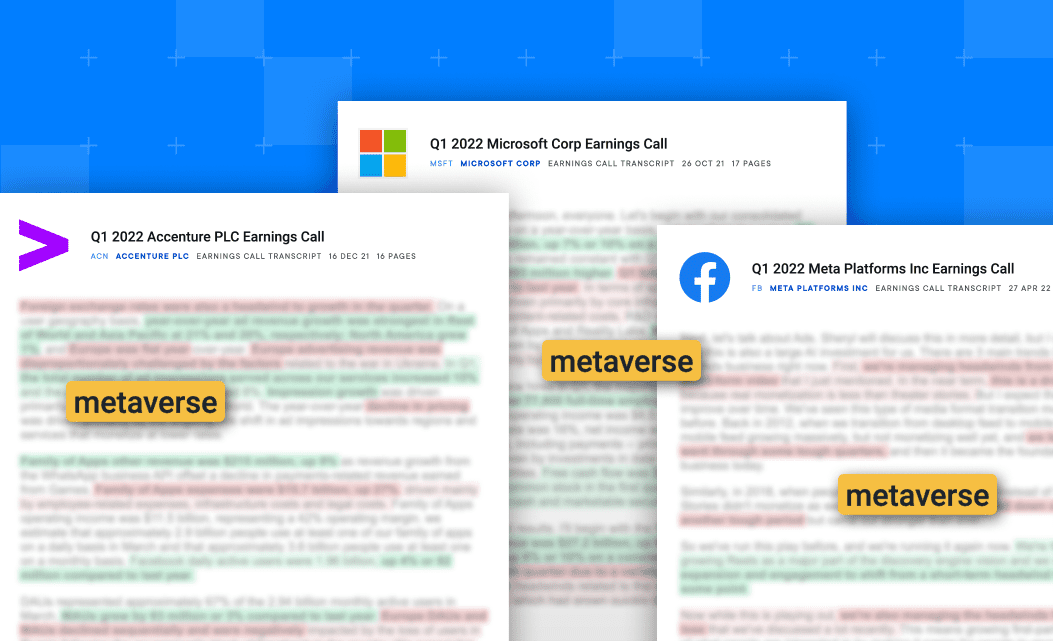From attending virtual events with the avatars of online friends to traveling across the world through a VR headset, metaverse proponents predict an exciting reality that would allow users to explore the depths of their imaginations all from the comfort of their homes.
Major tech players like Meta (formerly Facebook), Microsoft, and PwC have been touting the metaverse as the next best thing to the invention of the internet and believe it to be the future of online interaction. But beyond the tech-giant hype, is the metaverse a sci-fi fantasy or the real deal?
If this recent earnings season has taught us anything, investors (and companies) are still not quite sure.
Related Reading: The Top Metaverse Stocks to Watch
Mark Zuckerberg Backtracks On Initial Metaverse Comments
Last October, Mark Zuckerberg told the world he was doubling down on the metaverse, an endeavor with a slow burn growth trajectory. Now that his company’s stock price has gone down in recent months, he has started to backtrack on his initial comments. There’s no stronger endorsement of a trend than renaming your multi-billion dollar company to align with the trend.
During the company’s first-quarter earnings call, Zuckerberg noted:
First, I think it’s useful to level-set on our business trajectory over the last few years. After the start of Covid, the acceleration of e-commerce led to outsized revenue growth, but we’re now seeing that trend back off. However, based on the strong revenue growth we saw in 2021, we kicked off a number of projects to accelerate some of our longer-term investments, especially in our AI infrastructure, business platform, and Reality Labs. These investments are going to be important for our success and growth over time so I continue to believe we should see them through. But with our current business growth levels, we’re now planning to slow the pace of some of our investments.
Meta’s profits in Q1 were $7.5 billion, down a whopping 21% from Q1 of last year. Revenue grew to $27.9 billion, a 7% growth rate, the slowest since the company went public a decade ago. Don’t let these numbers fool you: Zuckerberg still plans to spend billions a year building metaverse-related devices and software, a concept he still believes wholeheartedly in.
Oftentimes, stock prices don’t tell the full story but in this case, they set the narrative. The price of Meta stock has plummeted nearly 50% since the rebrand from last October. At that point, Zuckerberg had already revealed he was currently spending $10 billion a year on the Reality Labs division of Meta, an investment he believes will see a return in the latter half of this decade.
Ad-driven social media has always sat at the core and heart of Facebook. In recent years, that isn’t the case, and investors are taking notice. Despite the pivot to Meta, Facebook’s growth has slowed down considerably thanks to video platforms like TikTok and Apple’s ad tracking changes. On top of that, regulations have hindered Zuckerberg’s ability to jumpstart growth through massive social media acquisitions.
Tech Stocks Down Across the Board
After the 2020 market crash, Big Tech company stocks soared. Investors flushed with cash (due to the central banks propping up the economy) capitalized on their growth. Fast forward two years to right now – Wall Street is feeling skeptical as they take a second look at these companies and wonder if they can maintain their momentum to justify their high valuations.
To add salt to the wound, the Federal Reserve has yanked support for the economy to fight the highest inflation rate in decades. Yields on US bonds have jumped up in anticipation of the Fed’s plan to raise interest rates, which currently sits at 2.76%, up from 1.5% from the beginning of 2022. As yields rise, it is natural for investors to start rethinking some of their riskier bets on the future earnings of certain companies, meaning tech stocks start to look less appetizing. The bigger the tech stock, the bigger the disappointment, as we’ve seen with FAANG stocks. The FAANG group – Meta, Apple, Amazon, Netflix, and Google – have been well-known entities to investors for years now. These companies were at the front of the pack during the long U.S. tech stocks bull cycle. In this latest earnings season, all of them are significantly down, particularly Netflix, Amazon, and Google.
Though many tech stocks have lost their appeal, not all earnings are a cause for concern. Microsoft reported that its revenue rose 18%, with shares up 4% in premarket trading. Whether reported earnings were favorable or not this quarter, three major themes emerged from the transcripts:
- Companies are looking to utilize the metaverse to expand workplace experiences and engagement for their employees.
- Metaversal travel and entertainment opportunities are expanding, with successful campaigns already underway.
- Luxury brands and other commodity companies are hesitant to go all-in on the metaverse, with many citing they are focused more on physical products versus virtual experiences.
Through the AlphaSense platform, we dug into the quarterly earnings transcripts to expand further on these three trends.
Enhancing Workplace Experiences
According to the Pew Research Center, the impetus to work from home has shifted significantly since 2020. Today, workers are choosing to work from home unrelated to necessity. Among those who have a physical office space outside of their home, 61% now say they are actively deciding not to go into their workplace. This is a hot area of focus for metaverse evangelists who see a prime opportunity to build on virtual engagement with employees by creating communal office space and working sessions in the metaverse.
Working remotely can cause strains in communication, forcing teams to work even harder at attaining cohesion. Companies investing in metaversal workplace enhancements are hoping to help encourage collaboration and camaraderie through virtual experiences that allow employees to gather together outside of a typical Zoom environment. Other companies are building metaversal elements to enhance employee training and engagement.
Accenture | Shareholder/ Analyst Call
Accenture created and operates what we believe is the largest enterprise Metaverse we call Nth Floor and includes everything from this space we’re in, to other virtual worlds. And it also includes digital twins of our offices in our labs, our real spaces, and we conduct hundreds and thousands of meetings for groups for our people and our clients in these spaces in the Metaverse today. Now many look at Metaverse as something just for the future. They hear a lot of hype and there’s a lot of confusion around it. But we really have a different view. Our view is that it’s really about the Metaverse continuum.
Microsoft | Q1 2022 Earnings Transcript
Dynamics 365 is growing faster than the business applications market overall. For example, in a world of supply chain constraints, we are helping companies like Cracker Barrel and Unilever predict disruptions before they happen. Businesses like Heineken and Siemens are turning to Dynamics 365 to drive and deliver more consistent and personalized customer engagement and service. We are leading innovation in new industrial metaverse to help companies optimize their operations using technologies such as IoT, digital twins, connected spaces and mixed reality applications.
Expanding Travel and Entertainment Opportunities
On the surface, the idea of virtual reality seems counterintuitive to travel and other in-person experiences. Why would people want to spend time, energy, and money on travel, flights, and experiences when they can engage in those same activities from a VR headset in their home? The most obvious answer lies in the physical sensations that encapsulate people, places, and cultures, such as smells, tastes, and the ability to hold something physically in your hands. In this way, the metaverse has a long way to go. But, there are still so many areas for companies to engage with users while still tapping into travel and experiences.
Companies are reporting their interest in expanding travel experiences in their earnings calls through initiatives such as: utilizing VR to experience a hotel before booking, expanding ways for users to ask questions, combine products, and even pay in more convenient ways, and increasing customer service and satisfaction opportunities. Beyond travel, food and beverage companie can expand their digital presence through integrated marketing campaigns that bridge the real and the virtual.
Travelzoo | Q1 2022 Earnings Transcript
I am happy to speak about Travelzoo’s new initiatives towards a paid subscription-based service. It’s called Travelzoo META and it will take subscribers to the travel and entertainment experiences of the Metaverse. We perceived the Metaverse as disruptive and abundant with lucrative opportunities for innovative companies that are willing to be the first mover. In addition, by being part of the Metaverse, Travelzoo META believes it can diversify Travelzoo’s current demographic.
Chipotle | Q1 2022 Earnings Transcript
Our marketing team continues to do a tremendous job of keeping Chipotle relevant in culture, driving difference as well as transactions. We continue to leverage both traditional and nontraditional media to increase awareness and amplify the brand… We remain a leader in the digital space with our latest Chipotle Metaverse experience that launched on National Burrito Day, garnering more than 4 million game plays in the first week.
Heineken | Shareholder/ Analyst Call
To this end, we needed a disruptive plan that would capture the hearts and minds of the Gen Z generation, so we have ventured onto the metaverse by launching our first virtual beer, an ironic joke, winking at ourselves and at other brands by launching a beer in the only place you can enjoy its extra refreshing taste. If you don’t know what the metaverse was, you’re not alone. This was the first time in my career that I started to feel old. I had no idea what it was, but a new world has opened up to us, especially last month.
It’s great — it’s greatly disrupted the status quo in the brand.
Companies with Hesitation
In our recent blog, The Top 16 Metaverse Stocks to Watch, we reported on luxury fashion giants’ interest in the metaverse. Industry titans such as Nike, Louis Vuitton, and Burberry are at the forefront of digital transformation in the fashion world.
Though tech has always been a way to perpetuate luxury consumption, Q1 2022 earnings transcripts paint a different story for several high-end fashion and commodity brands. There is a hesitation from these brands to go all-in on the metaverse, emphasizing their top priority lies with physical products and real-world experiences.
Louis Vuitton | Shareholder/ Analyst Call
On the strategy, you’ve asked various questions on digitalization. Well, great many digital activities. All our companies have e-commerce sites that are readily modernized they are very efficient. You ask us the metaverse. Well, it’s really — everybody is talking about the metaverse. We need to look at it. We’re looking at it closely, but we think we need to be prudent. There’s no point, I think, to be the first in any event. What we want is to sell real products.
Hermes | Shareholder/ Analyst Call
Now, on the metaverse question. I don’t know if — I mean, some people have already managed to turn it into a growth driver, but I think for the time being, we’re still interested and curious to see how the world evolves and changes. Interesting to see this virtual universe. We’re looking at these innovations and how they could conceivably be of interest to us. This may be a good means of communication, but after all, we’re first and foremost, artisans, we make objects in the metaverse. We haven’t yet figured out how to figure hot to make objects. But still, we’ll look into this. And conceivably, we’ll also be creative and find a position for Hermès in the metaverse, this is not a priority of ours. We’re mainly here to look at innovations that may be interesting rather than rush into the metaverse.
LOreal | Shareholder/ Analyst Call
Makeup brands, virtual makeup. We have partnership agreements with NYX and NYX professional makeup has undertaken a number of initiatives. In the area of metaverses, we have brands that use ambassadors or models that are virtual themselves. The latest Prada fragrance has a virtual model, NYX too. So it’s an opportunity for engaging with consumers. And maybe in the future, we will also use metaverses to sell virtual products, makeup kits, for example.
Because our primary task is to manufacture and sell tangible beauty products that actually work and that actually can be demonstrated. But obviously, we’re good at finishing what we started. And obviously, we’re going to spend most of our effort to selling real products, real mascara, real anti-glamor skin creams to our consumers. Virtual comes next.
When it comes to the metaverse, it’s difficult to understand what is real and what is hype. Will the metaverse actually become our new reality in the next decade? How far off are we, and what does that mean for all the industries that will be impacted? Answer all of your questions and more in our latest report, The Future of the Metaverse: An Analysis of the Leaders, Opportunities, and Threats.





